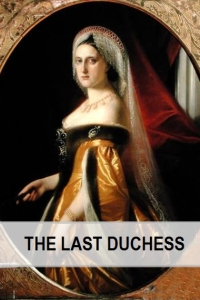
Based on MY LAST DUCHESS by Robert Browning
That’s my last Duchess painted on the wall,
Looking as if she were alive. I call
That piece a wonder, now; Fra Pandolf’s hands
Worked busily a day, and there she stands.
Will’t please you sit and look at her? I said
“Fra Pandolf” by design, for never read
Strangers like you that pictured countenance,
The depth and passion of its earnest glance,
But to myself they turned (since none puts by
The curtain I have drawn for you, but I)
And seemed as they would ask me, if they durst,
How such a glance came there; so, not the first
Are you to turn and ask thus. Sir, ’twas not
Her husband’s presence only, called that spot
Of joy into the Duchess’ cheek; perhaps
Fra Pandolf chanced to say, “Her mantle laps
Over my lady’s wrist too much,” or “Paint
Must never hope to reproduce the faint
Half-flush that dies along her throat.” Such stuff
Was courtesy, she thought, and cause enough
For calling up that spot of joy. She had
A heart—how shall I say?— too soon made glad,
Too easily impressed; she liked whate’er
She looked on, and her looks went everywhere.
Sir, ’twas all one! My favour at her breast,
The dropping of the daylight in the West,
The bough of cherries some officious fool
Broke in the orchard for her, the white mule
She rode with round the terrace—all and each
Would draw from her alike the approving speech,
Or blush, at least. She thanked men—good! but thanked
Somehow—I know not how—as if she ranked
My gift of a nine-hundred-years-old name
With anybody’s gift. Who’d stoop to blame
This sort of trifling? Even had you skill
In speech—which I have not—to make your will
Quite clear to such an one, and say, “Just this
Or that in you disgusts me; here you miss,
Or there exceed the mark”—and if she let
Was courtesy, she thought, and cause enough
For calling up that spot of joy. She had
A heart—how shall I say?— too soon made glad,
Too easily impressed; she liked whate’er
She looked on, and her looks went everywhere.
Sir, ’twas all one! My favour at her breast,
The dropping of the daylight in the West,
The bough of cherries some officious fool
Broke in the orchard for her, the white mule
She rode with round the terrace—all and each
Would draw from her alike the approving speech,
Or blush, at least. She thanked men—good! but thanked
Somehow—I know not how—as if she ranked
My gift of a nine-hundred-years-old name
With anybody’s gift. Who’d stoop to blame
This sort of trifling? Even had you skill
In speech—which I have not—to make your will
Quite clear to such an one, and say, “Just this
Or that in you disgusts me; here you miss,
Or there exceed the mark”—and if she
Herself be lessoned so, nor plainly set
Her wits to yours, forsooth, and made excuse—
E’en then would be some stooping; and I choose
Never to stoop. Oh, sir, she smiled, no doubt,
Whene’er I passed her; but who passed without
Much the same smile? This grew; I gave commands;
Then all smiles stopped together. There she stands
As if alive. Will’t please you rise? We’ll meet
The company below, then. I repeat,
The Count your master’s known munificence
Is ample warrant that no just pretense
Of mine for dowry will be disallowed;
Though his fair daughter’s self, as I avowed
At starting, is my object. Nay, we’ll go
Together down, sir. Notice Neptune, though,
Taming a sea-horse, thought a rarity,
Which Claus of Innsbruck cast in bronze for me!
Do come in, Sir!” the stately footman stood aside, oak-like, at the high wooden door, as I made my way into the highly ornamental drawing room. This was the first time I was entering the Duke’s mansion, and it was all I could to stop myself from gasping, at all the exquisite artifacts that were strewn around in careless precision. The footman preceded me in all his paunchy glory, and stopped at another ornate wooden door, to announce my name. “Mr. Lawrence, the envoy of the Count of Tyrol is here to see you, my Lord,” he said ponderously.
As I walked into the large room, the Duke of Ferrara came forward to greet me. “Welcome, young man! I have been expecting you!”
There was a smile on his face, a smile that quite unsettled me. His face was flushed, proving that he was a man obviously fond of his food, and even more, his drink. Even his ornate attire could not mask his portly figure. After the initial pleasantries, he remarked, “Come along! Let me show you something!” He led me outside the room, where we both paused before the grand staircase of the ducal palace. There, at the head of the staircase, was the painting of a beautiful young woman, which he drew my attention towards, with a curtain that had been drawn aside, obviously for my benefit. “There she is, my last Duchess!” he proclaimed. “My last Duchess painted on the wall. Doesn’t she look almost alive?”
I looked on, and my eyes remained riveted to the wonderful painting. Whoever had created it was a true genius! The beauteous face had an earnest look about it, a countenance filled with passion and depth. I started to say all this in my own manner, but the Duke interrupted me. “You are not the first one to wonder at her beauty, at the spot of joy on her fair cheeks!” He gave me a sidelong glance.
I could not stop staring at the painting. She looked so real, a smile in her eyes, as though she loved life, and living, above all things. There was a suppressed joy in her eyes, an expression that implied that the artist had made her smile as he was painting her.
“Are you wondering what brought that smile on her face?” the sudden query took my breath away. How on earth did the Duke read my mind with such accuracy? “Don’t worry, my man! That is the first thought that goes through the mind when one sees the painting for the first time!” He smiled, and the smile was unpleasant. “I too wondered about that! How naïve she was, how easily she gave her smiles away to all and sundry! She was too easily impressed and thanked people easily.”
“Isn’t that a good quality?” I wondered, though I did not say so openly. The Duke clicked a finger at a hovering footman. “Tea and sandwiches for the gentleman!” Then he turned his attention back to the painting that seemed to occupy all his thoughts at the moment.
“So what do you think about the painting?” the sudden question threw me off balance. T was as though he enjoyed seeing my discomfiture.
“Your Grace, I think it is a mm…marvelous likeness of your first wife!” I stuttered, for I had heard it said that the lady in question was beautiful, a shy rosebud of a girl when he first married her.
“It is, indeed! The artist has done her justice!” he said, nodding with pride. “He even captured her blushes and the light in her eyes. I wonder how he made her blush? Was it something he said about the style of her sleeves? Or the cut of her gown?” There was a speculative expression in his hooded eyes. It was as though he was looking at a priceless possession rather than his beloved wife.
We sat down to tea and sampled dainty sandwiches that melted in the mouth. I was ravenous as I had not eaten since morning. The sandwiches vanished, and I was hungry for more. As I glanced surreptitiously at the door, hoping for more sustenance, he spoke again, breaking my reverie.
“What was I saying? Ah, yes, she was too quick to give her smiles away! A bough of cherries presented to her would bring a smile! As would the gift of a white mare, or a tiny bouquet of flowers!” There was a suppressed rage in his eyes, that I could see clearly now, and it quite took my appetite away.
“Have you any idea how old my family is?” The Duke raised his voice to emphasize the point. As I looked at him, and shook my head, he went on, “800 years! That is how old my family is. My ancestors have fought in old battles and claimed rewards from the monarchs of yore. We have covered ourselves in glory over the centuries, as true warriors and patriarchs!” I nodded, overwhelmed by the vision he created in my mind, coming from plebian stock myself, though I had no idea why he was telling me all this.
“But did my first wife appreciate all this? No, she did not! She allowed herself to be beguiled by things as mundane as cherries and flowers, equating them with the honour of being part of a renowned ancient family.” The wound had gone deep, as the frown on his face showed his disapproval at her seeming irreverence. “Her looks went everywhere!” he continued sullenly, “and she cast them at every person she came across, be it the footmen, the gardeners, chance visitors or the artist who painted her.”
He looked at me with an arch glance. His expression suggested that no more would her looks go anywhere, as he kept her painting covered with a curtain which only he had the right to unveil. I could not help wondering where the lady was at present, now that she no longer lived at the Duke’s abode. I framed a polite query, hesitating to sound over curious. “My Lord, where is… I mean…is she…?”
“Where is my first wife now?” He laughed at my timidity. “I have packed her off to a nunnery. That is the ideal place for one like her.” I pitied the young lady who smiled gently out of the frame. She looked young, childlike, and from all that the Duke had mentioned, a good natured and radiant girl, who had married a man much older than her. Maybe it was his possessiveness that made him see her behaviour in a different light. How would she survive in a nunnery, her beautiful hair hidden by a wimple, her face pale and strained in an atmosphere so strange? My heart broke to think of her, caged like a pretty bird that loved its freedom.
It was clear that the Duke was also in a cage of his own making, one of arrogance and condescension. He was not the kind to stoop to anyone or anything, or so he claimed. I had begun to feel claustrophobic in his company, but I could hardly leave before we discussed the reason why I had come to the Duke in the first place.
I was an envoy on behalf of the Count of Tyrol, whose daughter was fated to be the second wife of the Duke, now that he had rid himself of his first wife. We needed to discuss the arrangements and the dowry. The Duke who had boasted that he would not stoop before anybody, least of all his first wife, seemed particularly eager to placate the Count, from whom he expected a grand dowry for the honour he was according them by accepting his daughter in marriage! His statement, “I choose not to stoop,” appeared hollow to me. I found myself disliking the Duke more and more as the day progressed.
However, I was only an envoy and I could not afford to let my dislike show. The Duke continued to discuss the details. “I am sure that the Count, my future father in law will be generous in the dowry he offers me, and who am I to disallow it?” The glint in his eye was unmistakable, as he hurriedly went on, “Of course, his fair daughter is my main object,” a statement that sickened me, as I sensed the falsehood behind it.
Finally I summoned up the courage to ask, “Is the lady in the painting happy at the convent?” The Duke’s thick eyebrows bristled, and he shot a sharp glance at me. The next moment, he smiled falsely, as he repeated, “Yes, she is! She is where she deserves to be. I gave her everything she needed, and yet, she lived in a world of her own.” Once again, he seemed set to embark on his pet topic – his first wife, who was an obsession with him.
“She lacked for nothing. I married her, gave her my family name, and what did I want in return? Only her love, which was erratic, and her attention which kept straying! I am not the jealous kind, but I had to draw a line. She smiled, no doubt when I passed her, but who passed without much the same smile? This grew!” There was a pause, and I felt a finger of dread run up my spine at the expression on his face, at his deepset eyes which held a menace within their depths. His next words struck at my heart, and then I knew the truth, like a blinding flash that left me dazed. I knew exactly where the last Duchess was, where he had dispatched her. He strode to the painting as he spoke, drawing the curtain over it with a quick gesture. “I gave commands; then all smiles stopped forever. There she stands as if alive!”
About the Author







Comments